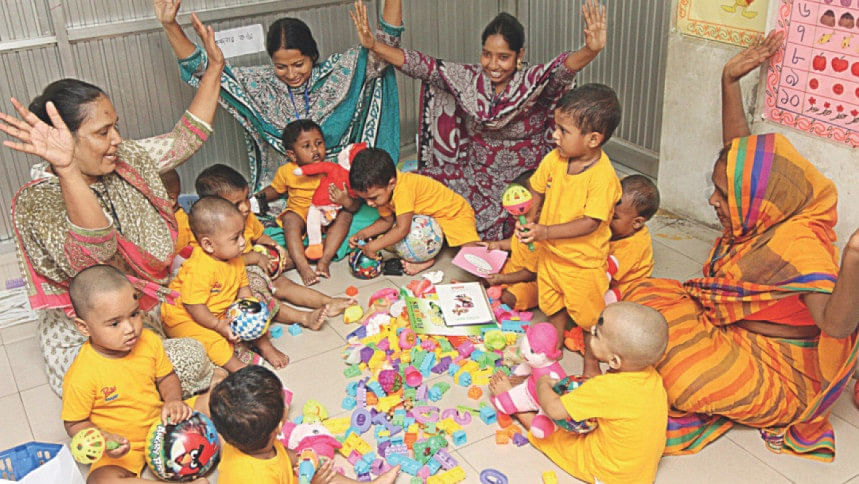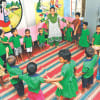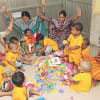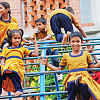Who is holding the baby while she works?

At eight in the morning, the university gates open to a stream of students, faculty members, and staff. Among them is a young woman, hurriedly pushing a stroller with one hand while balancing a laptop bag on her shoulder. She kisses her child goodbye—hesitantly—and rushes to her classroom. This scene, while increasingly common in our academic spaces, is also deeply revealing. It tells the quiet story of working mothers in Bangladesh, one rarely acknowledged in institutional policy, yet urgent and emotionally resonant. The question is no longer whether we need daycare centres in educational institutions, but how much longer we will deny their necessity.
In Bangladesh, as of 2023, women accounted for 65.5 percent—roughly 252,000—of primary school teachers. In lower secondary and secondary education, women made up 23.5 percent and 25.4 percent of teaching staff, respectively. At the tertiary level, the figure stood at 27.76 percent. While this progress is commendable, it uncovers an institutional paradox: women are encouraged to enter education, but the support systems necessary to retain them—such as on-campus daycare—remain grossly inadequate.
In a country where over 42.68 percent of women participate in the labour force, the absence of institutional childcare support forces many to underperform, take extended leave, or leave the workforce altogether. This is not just an economic issue; it is a question of social justice.
When a new mother returns to work after maternity leave, her most daunting challenge is not academic performance or professional capability—it is childcare. Who will hold her baby while she lectures? Who will feed her child when she is busy grading papers?
Extended families, the once-trusted support system, are no longer a viable option, especially in urban nuclear households. Domestic workers are both hard to find and, more importantly, often untrained and unsupervised. As one working mother shared, "Since I have no relatives in Dhaka, it was extremely difficult for me to take care of my child during office hours. I was constantly anxious at work until I found a reliable daycare." Her story is echoed in thousands of households.
While workplaces must adapt to the changing contours of the workforce, universities carry an added moral burden. They are institutions of enlightenment, equality, and future-building. Yet, they are often the last to adapt to gender-sensitive infrastructure. A university without a daycare centre is an environment that punishes women for choosing both motherhood and career. It sends a message, deliberate or not, that the ideal academic is childless or male. For student-mothers and faculty alike, this results in missed classes, disrupted research, and emotional stress.
Moreover, universities are uniquely equipped to provide quality daycare facilities. With departments in psychology, early childhood education, or nursing, many campuses could develop high-standard, supervised centres that double as experiential learning labs. It's a win-win: educators can teach, students can learn, and children can thrive.
Let's be clear: daycare is not just a holding room. It is a place of cognitive, social, and emotional growth. High-quality daycare centres are structured around a child's needs. Trained caregivers follow regimented schedules that include nutritious meals, story time, group play, arts and crafts, and basic literacy work. A growing body of research shows that children who attend structured daycare are more emotionally resilient and perform better academically in their early school years. In Bangladesh, this is especially important, given the rampant inequalities in early childhood education access. Moreover, daycare centres, when well-regulated, play a preventive role in child abuse. They reduce the dependency on untrained domestic help or leaving children unattended, both of which are common risk factors for neglect and trauma.
If we are serious about building an inclusive, equitable Bangladesh—one where women can thrive as mothers and professionals—we must reimagine our public institutions. Every university, college, and school must have a functioning, safe, and affordable daycare facility. This is not just about mothers. It is about the next generation of Bangladeshis—whom they grow up to be, how they socialise, what opportunities they receive, and whom they trust. A society that refuses to hold its children with care cannot claim to hold a future worth striving for.
Section 94 (1.2) of Bangladesh Labour Act mandates that every institution with more than 40 female employees must provide a daycare facility for children under six. However, enforcement is lax, and compliance is more the exception than the rule. Many institutions offer a "sick room" or a single nanny in an empty office room, which is a far cry from what children or their mothers deserve. The few quality daycare centres that do exist remain expensive and inaccessible to most middle- and lower-income families. The market cannot solve what policy refuses to address.
There remains significant stigma around daycare use in Bangladesh. Some see it as a symbol of parental failure or laziness. Others believe young children must remain only in familial settings. But these myths are increasingly out of touch with urban realities.
The truth is, even stay-at-home mothers can benefit from daycare facilities. Children need socialisation with peers. They need space to run, explore, and engage. No amount of screen time or solitary play can replace the developmental advantages of structured group interaction.
Moreover, with proper training and regulation, daycare workers can offer a level of specialised developmental care that most homes cannot. From speech therapy to emotional support, their role is indispensable.
If we are serious about building an inclusive, equitable Bangladesh—one where women can thrive as mothers and professionals—we must reimagine our public institutions. Every university, college, and school must have a functioning, safe, and affordable daycare facility.
This is not just about mothers. It is about the next generation of Bangladeshis—whom they grow up to be, how they socialise, what opportunities they receive, and whom they trust. A society that refuses to hold its children with care cannot claim to hold a future worth striving for.
As a nation, we have spent years trying to increase women's participation in education and employment. Now, we must complete the loop. We must invest not only in women's work but also in what makes their work sustainable: comprehensive childcare.
Let us remember the wisdom of Kahlil Gibran, who once wrote, "Your children are not your children. They are the sons and daughters of Life's longing for itself." If life longs for anything, it is care, continuity, and compassion. Let us not fail it at the gate.
H.M. Nazmul Alam is an academic, journalist, and political analyst. He can be reached at [email protected].
Views expressed in this article are the author's own.
Follow The Daily Star Opinion on Facebook for the latest opinions, commentaries and analyses by experts and professionals. To contribute your article or letter to The Daily Star Opinion, see our guidelines for submission.

 For all latest news, follow The Daily Star's Google News channel.
For all latest news, follow The Daily Star's Google News channel. 









Comments